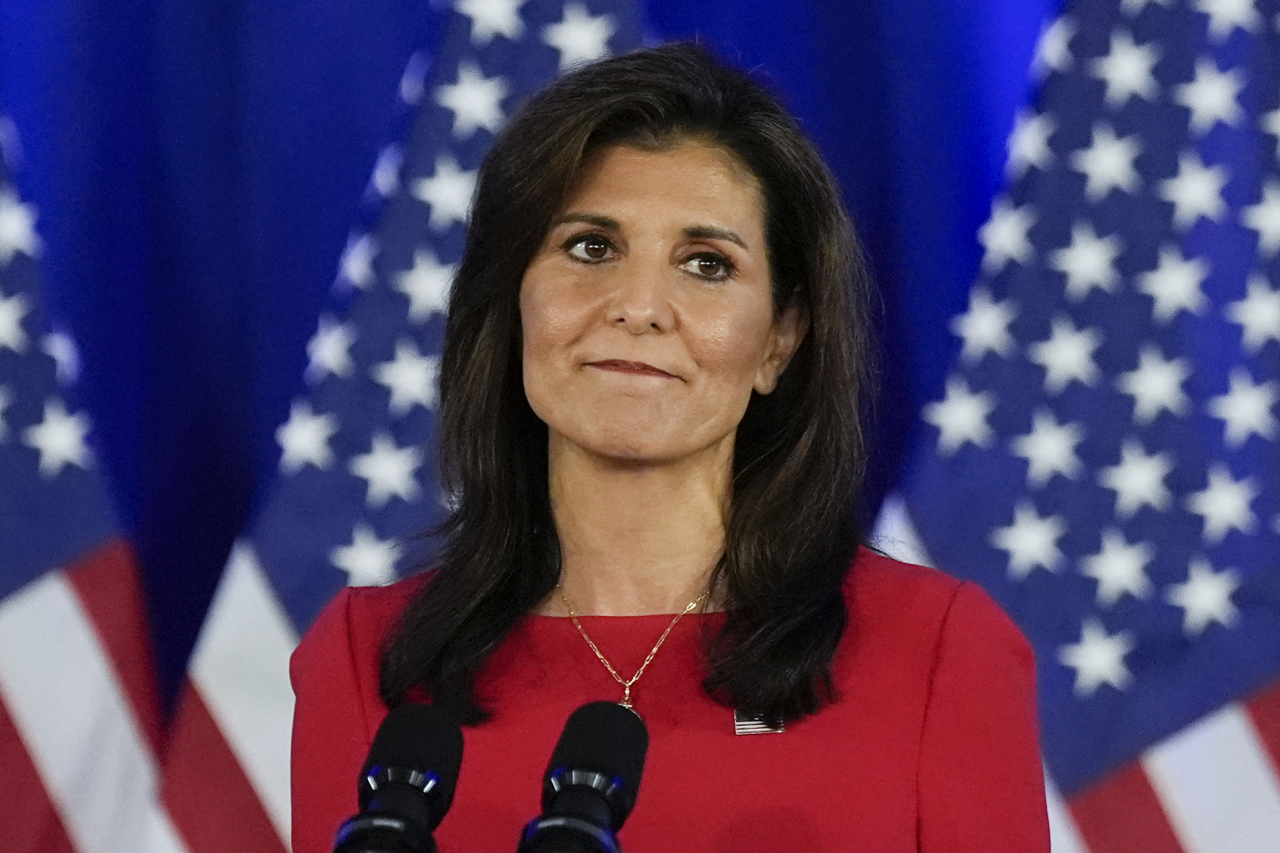 |
Republican presidential candidate, former UN Ambassador Nikki Haley announces the suspension of her presidential campaign at her campaign headquarters on Wednesday in Daniel Island, South Carolina. (AFP-Yonhap) |
CHARLESTON, South Carolina -- Nikki Haley ended her long-shot challenge to Republican presidential frontrunner Donald Trump on Wednesday, ensuring the former president will be the party's candidate in a rematch with Democratic President Joe Biden in November's election.
Haley, the former South Carolina governor and Trump's ambassador to the United Nations, bowed out a day after Super Tuesday, when Trump beat her in 14 of 15 Republican nominating contests.
"The time has now come to suspend my campaign," Haley told supporters during a speech in Charleston. "I have no regrets."
She said it was likely Trump -- who repeatedly belittled her candidacy -- would be the Republican nominee but did not endorse him.
"It is now up to Donald Trump to earn the votes of those in our party and beyond it who did not support him," she said. "And I hope he does that."
Drawing on her foreign policy experience at the UN, Haley said it was important to continue US global leadership.
Throughout her campaign, Haley said the United States must help Ukraine defend itself against Russian aggression, a position at odds with Trump.
"If we retreat further, there will be more war, not less," she said.
Trump did capture the endorsement on Wednesday of Mitch McConnell, the longtime Senate Republican leader who some party hardliners considered insufficiently allied with the former president.
"It should come as no surprise that as the nominee, he will have my support," said McConnell, who is stepping down as leader.
There was no indication Trump would moderate his message.
Just as Haley was conceding the race, he criticized her before inviting her supporters to join him. "Nikki Haley got TROUNCED last night, in record-setting fashion," Trump wrote on Truth Social.
In contrast, Biden praised Haley for daring to "speak the truth" about Trump and extended his own invitation to her supporters.
"Donald Trump made it clear he doesn’t want Nikki Haley’s supporters. I want to be clear: There is a place for them in my campaign," Biden said in a statement.
On Wednesday, Trump reiterated his willingness to debate Biden in a post on Truth Social. Debates are typically held after the parties' nominating conventions in July and August.
In response, Biden campaign spokesman Michael Tyler said, "That's a conversation we'll have at the appropriate time in this cycle."
Trump refused to participate in any of the debates held during the Republican nomination fight.
Haley lasted longer than any other Republican challenger to Trump but never posed a serious threat to the former president, whose iron grip on the party's base remains firm despite multiple criminal indictments.
The rematch between Trump, 77, and Biden, 81 -- the first repeat US presidential contest since 1956 -- is one that few Americans want. Opinion polls show both Biden and Trump have low approval ratings among voters.
The election promises to be deeply divisive in a country already riven by political polarization. Biden has cast Trump as an existential danger to democratic principles, while Trump has sought to re-litigate his false claims that he won in 2020.
Haley, 52, drew support from deep-pocketed donors intent on stopping Trump from winning a third consecutive Republican presidential nomination, particularly after she notched a series of strong performances at Republican debates that Trump skipped.
She ultimately failed to pry loose enough conservative voters.
But her stronger showing among moderate Republicans and independents highlighted how Trump's scorched-earth style of politics could make him vulnerable in the Nov. 5 election against Biden.
As in 2020, the race is likely to come down to a handful of swing states, thanks to the winner-take-all, state-by-state Electoral College system that determines the presidential election. Arizona, Georgia, Michigan, Nevada, North Carolina, Pennsylvania and Wisconsin are all expected to be closely contested in November.
The central issues of the campaign have already come into focus. Despite low unemployment, a red-hot stock market and easing inflation, voters experiencing post-pandemic inflation have voiced dissatisfaction with Biden on the economy.
Biden's other major weakness is the state of the US-Mexico border, where a surge of migrants overwhelmed the system after Biden eased some Trump-era policies. Trump's hawkish stance on immigration -- including a promise to initiate the largest deportation effort in history -- is at the core of his campaign, just as it was in 2016.
Voters expect Trump would do a better job on both the economy and immigration, according to opinion polls.
Trump may be dogged by criminal charges throughout the year.
The federal case charging him with trying to overturn the 2020 election, perhaps the weightiest he faces, has been paused while he pursues a long-shot argument he is immune from prosecution.
Biden has said Trump poses a threat to democracy, citing the Jan. 6, 2021, attack on the US Capitol by a mob of Trump supporters seeking to reverse Biden's 2020 victory.
Abortion, too, will play a role after the nine-member US.
Supreme Court, buoyed by three Trump appointees, eliminated a nationwide right to terminate pregnancies in 2022. The subject has become a political liability for Republicans, helping Democrats exceed expectations in the 2022 midterm elections. (Reuters)




![[Exclusive] Hyundai Mobis eyes closer ties with BYD](http://res.heraldm.com/phpwas/restmb_idxmake.php?idx=644&simg=/content/image/2024/11/25/20241125050044_0.jpg)
![[Herald Review] 'Gangnam B-Side' combines social realism with masterful suspense, performance](http://res.heraldm.com/phpwas/restmb_idxmake.php?idx=644&simg=/content/image/2024/11/25/20241125050072_0.jpg)

